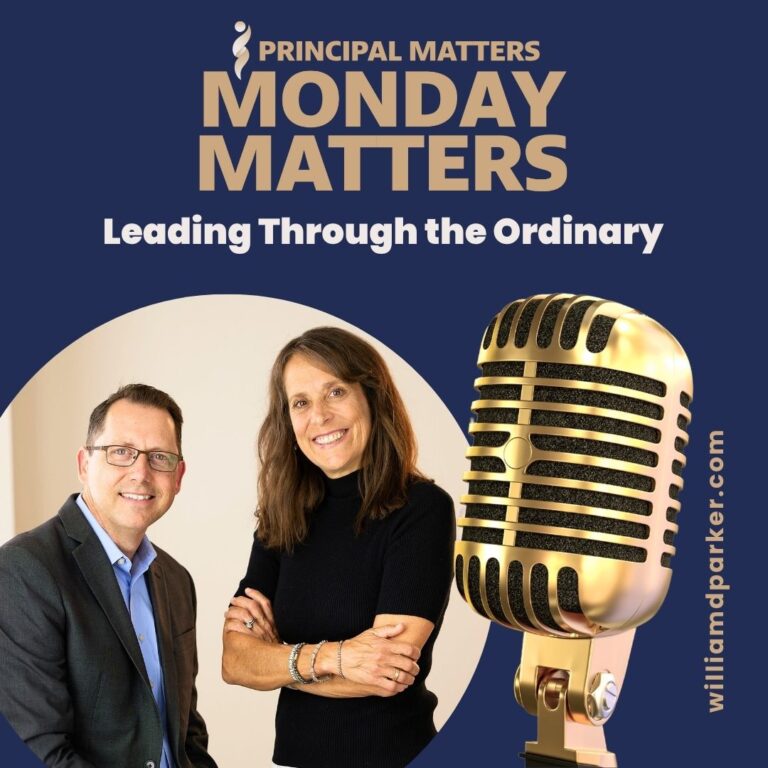Podcast: Play in new window | Download
Just a few days ago I was presenting to principals in Wichita, Kansas
I was a little nervous because I had been having trouble with my voice from some bronchitis in my lungs. The doctor had given me some meds to combat the congestion, and my voice was returning. At the same time, I was reminded what a gift it can be to communicate with words.
Have you ever thought about how much communication affects your work as a school leader? I once heard someone say that communication is 100% of a principal’s job. At first I wasn’t sure if I agreed. But when I began to think about how much a school leader is involved in planning, conversation, counseling or sharing, I had to agree that every part of his or her job includes some form of communication.
This week’s podcast is an edited version of a recent webinar presentation over the power of communication as well as three stories I share on the importance of teamwork. The webinar series is a book study from my first book Principal Matters: The Motivation, Courage, Action and Teamwork Needed for Principals.
Part 1 – 10 Tips for School Leaders in Communication
The first part of the conversation includes tips on enhancing your communication with some digital tools. Here are ten ways you can enhance communication with your students, teachers, or community members:
1. Using group emails for parents
2. Enhancing daily announcements
3. Power of newsletters
4. Updating your website
5. Emails for teachers
6. Why you must be visible
7. Awarding students
8. Hosting celebrations
9. Advocating and networking
10. Sharing and posting current calendars
Plus, I show some samples of various digital tools I use including Powtoons, Biteable, Mailchimp, Blogging, MovieMaker, Remind, and Social Media tools.
Part 2 – Lessons from a Crosswalk Guard
When my son and daughter were younger, they walked from our house to the elementary school they attended. Every day they passed Mr. Charlie, the crossing guard at the end of our street. They loved his funny sense of humor. One day he wasn’t at his post, and the kids froze on the sidewalk – all lining up unsure how to cross without Mr. Charlie.
Finally, a kindergartner said, “Hey, who’s the oldest?”
“I am,” said a fifth grader.
“Then you cross first,” said the little one, “And we’ll follow you.”
So on the count of three, all the kids ran across the street yelling, “We’re going to die!”
It made for a great story that night at our dinner table. Thankfully, the next day Mr. Charlie was back at his post, and my kids were so glad to see him.
As I think about the power one adult plays in the lives of students each day, here are three lessons from Mr. Charlie:
1. Remember the power of small things like punctuality, smiling, and being prepared. Students notice and it makes a big difference in the outlook and culture.
2. Assure every student and member of your team that he or she is valued. My children not only loved Mr. Charlie because he kept them safe, but also, he talked to each one and treated them with special attention. How are we doing that for our team members?
3. If you want strong culture, you must build relationships. Rigor, relevance, and relationship are the R’s for any effective instruction, but relationship trumps them all. Does each person on your team play such a strong role that he or she would missed if not there?
Part 3 – Lessons from a 10-year old
Tobias Bass had a dream to help his brother, Titus, who had cerebral palsy, to run a 5K. He knew this was only possible if he could push his brother in the race with a jogging stroller. His family didn’t have the means to purchase one, so Tobias as a local TV station to help him find one. Of course, supporters were thrilled to help. And when Tobias was asked why he was so determined to help his brother, he said, “I want to be his legs.”
How can we help others find their “legs” in the work we do with our teams? Here are five suggestions:
1. Provide moral support. Everyone needs someone who has their back and cheers them on in difficult times.
2. Be an active listener. Sometimes we fail to help because we fail to ask what others need. As Stephen Covey says, “Seek first to understand before being understood.”
3. Offer coaching and training. As you see others growing in their service, encourage them with good ideas and help them find training where they may need to grow.
4. Think ahead for resources needed. Even with tight budgets, we should be aware of what our teachers need to serve students, and work toward helping collect feedback on those needs so you can look for resources far in advance to the start of a school year.
5. Seek outside support. Whether it’s counseling, material resources, or donations, lots of organizations and businesses are willing to help if they are only asked.
Part 4 – Lessons from my son’s hospital stay
When my son Jack was 8 years old, he was diagnosed with a rare infections disease called Kawasaki. He spent ten days in the hospital receiving treatments. At first the treatments placed him into shock, so his team of doctors, nurses, technicians, etc. had to stabilize him and then treat him carefully for days before he finally recovered.
Watching others save Jack’s life gave me pause. What were the ingredients I saw in the powerful team of professionals surrounding him? Here are four:
1. Powerful things happen when diverse people unite around a common cause.
2. Powerful things happen each person knows his or her role and executes it well.
3. Reaching goals must go hand-in-hand with compassion and care.
4. Strong teams always remain teachable.
Jack is now a healthy 12-year old, but my experience with his hospital team helped me see how important it is when people treat your children as if they were also theirs. This should be the commitment we have with students. They may not be our own children, but we should treat them with the care and diligence we would want our own children receiving in their care.
Let’s Wrap This Up
This week as you think about your school, keep in mind that you are always communicating. Take advantage of the platforms you have to highlight, celebrate and support others. And then take to heart the lessons we can learn from crossing-guards, 10-year old boys, and hospital teams. You have an amazing opportunity to connect with others, build community, and serve those in your care!
Now It’s Your Turn
What is one commitment you can make to enhancing your communication with students, teachers or community members? Who is someone on your team who you should make sure knows he or she is valued? What resources or supports can you provide for your team(s)? How can you help others know their roles so that your team provides amazing service to your school community?
Sign-Up For Free Updates and Ebook
When you enter your email address here, you will automatically receive my newest posts and a free Ebook, 8 Hats: Essential Roles for School Leaders. Let’s keep learning together!
Principal Matters–The Book!
School leaders are very busy, so each of the twenty-four chapters is designed as a quick-read and followed with take-action questions for follow-up or reflection. If you want practical ideas on understanding your purpose, managing school teams, dealing with challenges, and leading with courage, action, motivation, and teamwork, go HERE to pick up a copy for you or your team.
Messaging Matters
Harness the power of messaging to create a culture of acknowledgment, respect, and celebration. Written specially for leaders, this title is divided into three parts, helping readers to maximize their role as chief communicators with students, teachers, and parents and community. Each chapter includes suggestions for using digital tools to enhance messaging and ends with reflection questions and practical next steps.




